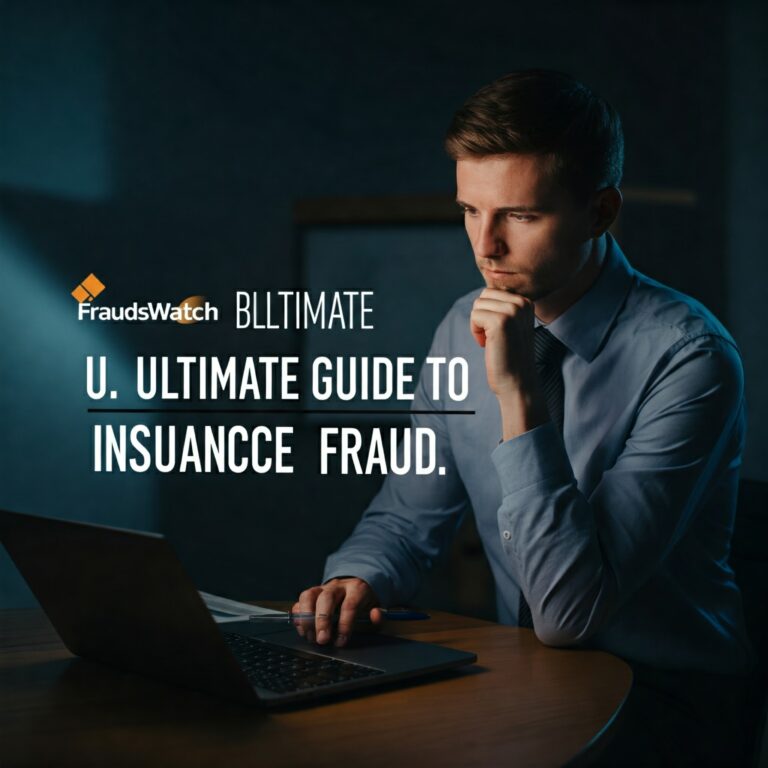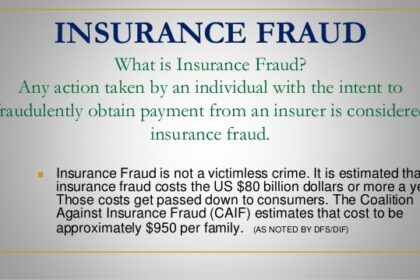Let’s be honest, insurance isn’t always the most exciting topic. But what is exciting is saving money and avoiding scams. And that’s where understanding insurance fraud comes in. It’s a bigger problem than you might think, and it impacts your wallet directly. We’re talking higher premiums for everyone, all thanks to those who try to cheat the system.
But here’s the good news: you’re not powerless. This guide is your secret weapon against insurance fraud. We’ll break down the sneaky tactics fraudsters use, show you how to spot the warning signs, and give you practical, real-world steps to protect yourself. Think of it as your personal insurance fraud defense system!
Decoding Insurance Fraud: It’s More Than Just Staged Accidents
You might picture insurance fraud as something out of a movie – a dramatic staged car crash or a faked injury. While those things do happen (we’ll get to that), fraud is often more subtle. It’s about the little lies and exaggerations that add up to a huge problem. Let’s break down the main types:
Hard Fraud: The Big, Bold, and Illegal Schemes
- What it is: This is the premeditated stuff. Think of it as planning and executing a crime specifically to get insurance money. It’s a felony and definitely not worth the risk!
- Real-World Examples:
- The “Swoop and Squat”: Imagine you’re driving along, and suddenly the car in front of you slams on their brakes for no reason, causing you to rear-end them. They might even have a car in front of them that “forced” them to stop suddenly. It’s a setup! These fraudsters often work in teams and file bogus injury claims.
- The Phantom Fire: Someone over-insures their property, then conveniently has a fire, destroying everything. They claim the insurance payout, hoping to get more than the property was actually worth.
- The Fake Death: Believe it or not, some people try to fake their own death to collect on life insurance. This usually involves forged documents and a lot of elaborate planning.
- Why you should care: Even if you’re not involved in a hard fraud scheme, you’re still paying for it through higher insurance premiums.
Soft Fraud: The “Little White Lies” That Add Up
- What it is: This is where someone takes a legitimate insurance claim and “pads” it a little (or a lot). It might seem harmless to exaggerate a bit, but it’s still illegal and hurts everyone.
- Real-World Examples:
- The “Upgraded” Theft: Let’s say your laptop gets stolen. You might be tempted to tell your insurance company it was the latest, most expensive model, even if it was a few years old. That’s soft fraud.
- The “Extra” Whiplash: You’re in a minor fender bender. You feel a little sore, but you tell your doctor you’re in excruciating pain, hoping to get a bigger settlement. That’s an exaggeration that constitutes soft fraud.
- The “Previously Damaged” Bumper: You accidentally back into a pole, damaging your bumper. You decide to include some old scratches from a previous incident in your claim, hoping insurance will cover everything. That’s adding unrelated damage, and it’s fraud.
- Why you should care: These “small” lies drive up the cost of insurance for everyone. It’s like sneaking extra items into your grocery bag without paying – it’s not fair to those who are honest.
Application Fraud: Lying to Get a Better Deal
- What it is: This happens when someone lies on their insurance application to get a lower rate or to qualify for coverage they shouldn’t. It might seem like a smart way to save money, but it can backfire big time.
- Real-World Examples:
- The “Accident-Free” Driver: Someone with a history of accidents might conveniently “forget” to mention them on their auto insurance application to get a lower premium.
- The “Healthy” Smoker: A smoker might lie about their habit on a life or health insurance application to avoid higher rates.
- The “Perfectly Maintained” Home: Someone might downplay the age or condition of their home on a homeowner’s insurance application, hoping for a cheaper policy.
- Why you should care: If you’re caught lying on your application, your policy could be canceled, your claims could be denied, and you could even face legal trouble. It’s simply not worth the risk. Honesty is always the best policy.
Spotting the Scams: Red Flags That Should Make You Suspicious
Now that you know the types of fraud, let’s get into how to spot them. Think of these as red flags waving, trying to warn you:
Insurance That’s Too Good to Be True
If an insurance offer seems unbelievably cheap, especially compared to other companies, be very cautious. It could be a scam, or the coverage might be so minimal that it’s practically useless.
- Think about it: Legitimate insurance companies need to make a profit to stay in business. If the price is drastically lower than the competition, they might be cutting corners somewhere, and that could hurt you in the long run.
High-Pressure Sales Tactics
A legitimate insurance agent will give you time to think things over and review the policy. If someone is pressuring you to sign immediately, especially if they’re using scare tactics or threatening to withdraw the offer, walk away.
- Think about it: They might be trying to rush you into a bad decision before you have time to realize it’s a scam.
Unsolicited Offers Out of the Blue
Be wary of calls, emails, or texts from insurance companies you’ve never heard of, especially if they’re offering amazing deals. Legitimate companies usually don’t operate this way.
- Think about it: Would you trust a random stranger on the street offering you a fantastic deal on something expensive? It’s the same principle.
Accidents That Seem “Off”
- The Sudden Stop: Be extra cautious if the car in front of you slams on its brakes for no apparent reason. It could be a staged accident.
- The Overly Helpful “Witnesses”: Be wary of witnesses who seem too eager to corroborate the other driver’s story, especially if they appear out of nowhere.
- Everyone’s Injured: If you’re in a minor fender bender and everyone in the other car claims to be seriously injured, that’s a major red flag.
- Think about it: Trust your gut. If something feels staged or orchestrated, it probably is.
Shady Repair Shops or Doctors
- Inflated Bills: Always get a second opinion if a repair shop’s estimate seems unusually high.
- Unnecessary Treatments: Be skeptical of doctors who recommend excessive or prolonged treatments, especially after a minor accident.
- Pressure to Use Specific Providers: Be wary if your insurance company or another party is pressuring you to use a particular repair shop or medical provider, especially if they’re not on your approved list.
- Think about it: Some providers might be in cahoots with fraudsters, inflating bills or recommending unnecessary services to maximize profits.
Your Action Plan: Practical Steps to Protect Yourself from Insurance Fraud
Okay, you’re now armed with knowledge about the types of fraud and how to spot them. But what can you actually do to protect yourself? Here’s your action plan:
Be a Smart Shopper
- Compare, Compare, Compare: Don’t just go with the first insurance offer you see. Get quotes from at least three different reputable companies.
- Read the Fine Print: Yes, it’s boring, but it’s crucial. Understand exactly what your policy covers, what the deductibles are, and what’s excluded.
- Ask Questions: Don’t be afraid to ask your insurance agent to clarify anything you don’t understand.
- Think about it: Being informed is your best defense. The more you know about your insurance, the less likely you are to be taken advantage of.
Document Everything
- Keep Records: Save copies of all your insurance documents, including your policy, applications, and any correspondence with your insurance company.
- Take Notes: After any phone call or meeting with an insurance representative, write down the date, time, who you spoke with, and a summary of the conversation.
- Take Photos: If you’re in an accident, take photos of the scene, the damage to both vehicles, and any injuries.
- Think about it: Having a detailed paper trail can be invaluable if you need to file a claim or if you suspect fraud.
Be Honest – Always
- Truthful Applications: Fill out your insurance applications accurately and completely. Don’t try to hide anything, even if you think it might increase your premium.
- Accurate Claims: When filing a claim, be honest about what happened and the extent of your losses or injuries.
- Think about it: Honesty is not only the right thing to do, but it also protects you from potential legal trouble and ensures your claims are processed fairly.
Verify, Verify, Verify
- Check Credentials: Make sure any insurance company or agent you’re dealing with is properly licensed in your state. You can usually verify this through your state’s insurance department website.
- Read Reviews: Look up online reviews of insurance companies and agents to see what other customers have to say.
- Think about it: A little due diligence can go a long way in protecting you from scams.
Protect Your Personal Information
- Be Stingy with Your Info: Don’t give out your Social Security number, driver’s license number, or other sensitive information unless you’re absolutely sure you’re dealing with a legitimate company.
- Beware of Phishing: Be cautious of emails or websites that ask for your personal information. They might be trying to steal your identity.
- Think about it: Your personal information is valuable to fraudsters. Keep it safe!
Report Suspicions
- Trust Your Gut: If something feels wrong, it probably is. Don’t be afraid to report your suspicions.
- Contact Your Insurance Company: If you suspect fraud related to your own policy, this is the first place to go.
- Contact Your State’s Fraud Bureau: They’re the experts in investigating insurance fraud.
- Contact the NICB: The National Insurance Crime Bureau is a great resource for reporting fraud.
- Think about it: Reporting fraud helps protect not only you but also everyone else who has to pay higher premiums because of these crimes.
Reporting Fraud: You Can Make a Difference
Reporting insurance fraud might seem intimidating, but it’s easier than you think. And it’s one of the most important things you can do to fight back. Here’s how to do it right:
Who to Tell
- Your Insurance Company: They have a vested interest in stopping fraud, and they often have dedicated fraud departments.
- Your State’s Insurance Fraud Bureau: These agencies are specifically designed to investigate and prosecute insurance fraud. You can find their contact information online.
- The National Insurance Crime Bureau (NICB): You can report fraud to them anonymously through their website or hotline (1-800-TEL-NICB). They work with law enforcement and insurance companies to combat fraud nationwide.
What to Provide
- The Details: Give a clear, detailed account of what happened, including dates, times, locations, and any other relevant information.
- The People Involved: Provide names, addresses, phone numbers – anything you know about the people you suspect of fraud.
- The Evidence: Share any documents, photos, or other evidence you have that supports your suspicions.
- Witness Information: If there were any witnesses, provide their names and contact information if you have it.
Conclusion: Be Smart, Be Safe, Be Insured
Insurance fraud is a real threat, but it’s one you can fight. By understanding how it works, learning to spot the red flags, and taking proactive steps to protect yourself, you can significantly reduce your risk of becoming a victim. Remember, reporting fraud is not just about protecting yourself – it’s about protecting your community and helping to keep insurance costs down for everyone. So be smart, be safe, and be insured – the right way! You’ve got this!














